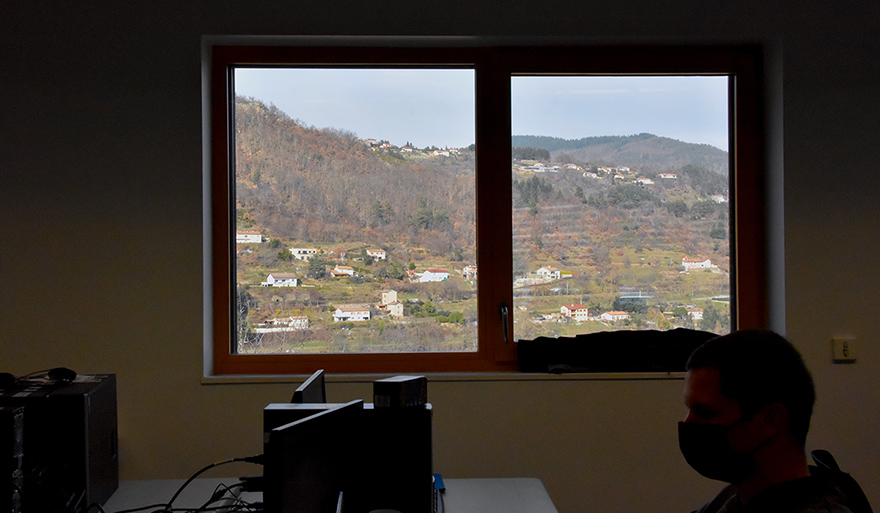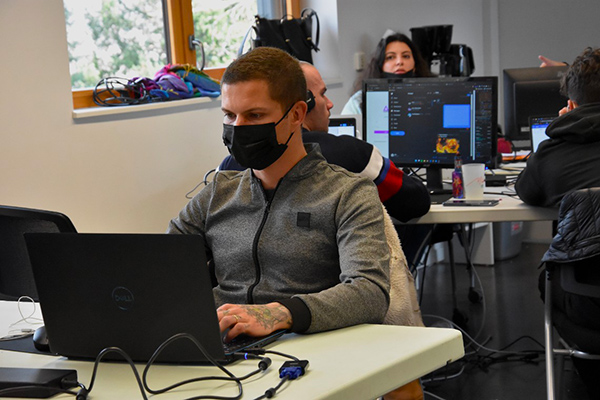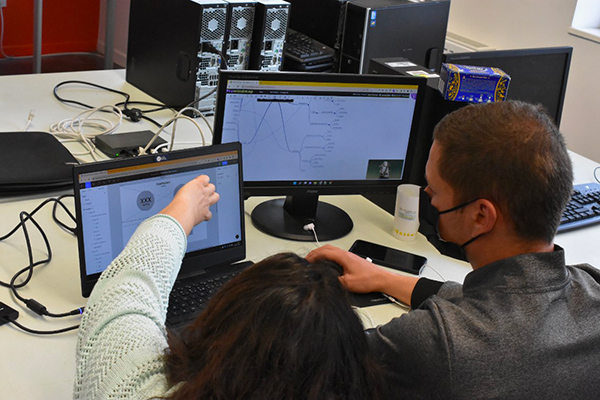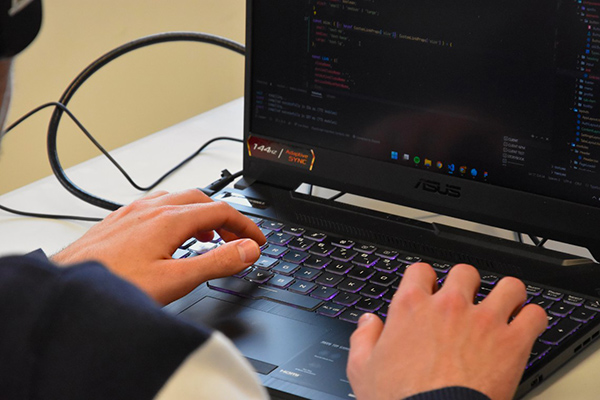Coding in the Valley: Rural Revitalisation through Digital Technology
Labo.VE, a partner of social enterprise Simplon, provides vocational web-related training for people in the Ardèche who either want to retrain or are currently unemployed. And the Ardèche town of Le Cheylard is banking on digital technology to attract business and prove that enterprise and rurality are not mutually incompatible.

Le Cheylard (France)
In spring and autumn the landscape is worthy of a computer desktop picture. It is also worth a visit towards the end of winter: houses plastered in white or beige judiciously spaced out on the lower slopes of the valley, dominated by the forest of still-bare trees above them. On the other side of the Eyrieux, the river that divides this natural corridor, the trainees gaze out at the landscape with vague eyes. From the other side of the window, their gaze seems instinctive rather than contemplative as they work on the project they will have to present to a judging panel in order to successfully complete their training, which ends in mid-April. Each of the fourteen students has to create a complete web application on the subject of their choice, “to include both web browser and server elements as well as data management,” says Patrice Armand, Head of Education at the Ardèche digital school, which forms part of Labo.VE.
Labo.VE has been working to develop digital technology in rural areas since 2015, with a particular focus on Le Cheylard, a town of 3000 inhabitants in the north of the Ardèche. It offers free training leading to a diploma in web and mobile software development (equivalent to Bac +2), primarily aimed at people with very little experience of digital technology. The students themselves are varied: some have completed high school or an apprenticeship, others are retraining or unemployed. No previous training is required. “The average age is 28, the oldest was 55. 25% of them are women. We want to increase that number, but there are still obstacles: either they don’t know about these kinds of jobs, or they think they are not for them,” says Operations Manager Marie-Laure Freydier.

According to Freydier, there is only one real enthusiast in this particular course, which started in September, with all the others being complete beginners. “Many of them have already trained for a profession, which is a plus, since they will have a dual skill,” says Patrice Armand. “Our goal is to turn them into professionals in the widest possible range of digital culture.”
Collaborative digital learning
Marie-Noëlle, 42, spent many years as a management assistant, which was not exactly her vocation. “The job was kind of forced on me when I was young. I didn’t really like it,” she says. She had always been drawn to computers so, following a skills assessment, she decided to train as a web developer. She says she has learned a huge amount in her six months at Labo.VE: “We won’t know everything, but we’ll have a good basis for finding work and completing our training on the job.” The Ardèche digital school is not a school in the traditional sense. Students do learn methods and theory but Head of Education Patrice Armand also wants to stimulate their ability to learn through experimentation. On this particular Wednesday he spent half an hour introducing a new concept and then left the trainees to work independently, in groups. Some of them work with one screen, others with two. They ask each other questions and help one another. “This is real digital work, meaningful and collaborative,” says Armand.
The project-based method is one of the specialities of the Simplon school, a social enterprise (ESUS) that trains people for digital professions. Labo.VE is one of its partners, and Simplon provides it with teaching aids and tools. Since its launch in 2013, Simplon has developed rapidly, largely thanks to more than one million euros in grants from various European funds (ERDF, ESD, ITII, YEI, NEETs). It now has 127 production centres, including the one in Le Cheylard, one of the smaller municipalities. The firm intention, Marie-Laure Freydier assures us, is to “revitalise the territory”.

Entrepreneurial centre
“Because there’s more to the place than just sheep and fir trees,” says Jacques Chabal, a 70-year old doctor who is also mayor of Le Cheylard. He is talkative, especially when the discussion turns to a subject he has been reflecting on ever since he was first elected in 1989: how to meet the needs of this valley, which used to be known for its textile and jewellery industries. Twenty-five years ago, the area lacked a high school. “It was a real challenge to get one built in a rural area,” he recalls. But they did it.
“Afterwards, we realised there wasn’t anywhere where people could meet and connect,” Chabal continues. And so the Poleyrieux Centre was opened in 2012, with the support of the Val’Eyrieux intercommunal association, of which he is also president. This third-sector centre for entrepreneurship not only enables networks to be intensified, but also houses a business incubator, the economy service of the Community of Municipalities, offices and a FabLab, and was therefore the obvious choice as the site of the digital school.

These training courses reflect the digital turn taken by a territory seeking to attract and retain inhabitants rather than lose them to the metropolitan areas. 78% of Labo.VE students find employment within six months of completing the course, but the job offers are still a long way from the valley. Nevertheless, there are signs of change: businesses are undergoing digital transformation, and the pandemic has led to a surge in teleworking. “Most of the people who move here are returners rather than newcomers,” says Morgane Maitrias, director of Poleyrieux. But he sees the existence of a digital training centre as a plus for companies looking to set up in the area: “They know they will have a pool of local talent to draw on.” Patrice Armand, Head of Education at the Ardèche digital school, acknowledges that it still needs a boost, even though it has already gained in visibility.
Change of status
And so Labo.VE is innovating. Last year it changed its legal status from an association to a cooperative society of collective interest, enabling it to market its services. “This is a way of attracting companies, creating an ecosystem around digital technology and making it accessible to all,” says Marie-Laure Freydier, who has also set up a second course, in mobile applications design and development. It is a sandwich course, equivalent to 4 years of higher education. Tatiana Gosso, from the Ardèche, who had previously spent half her life as a quality technician in the electronics industry, completed the first programme and then went on to do the second. At the age of 40, she says that “proximity to the school was a factor” when she decided to retrain. She values the training she has received and laments that “there are not yet many web companies offering employment locally”. Nevertheless, in the longer term, the presence of the school here may change that.
In any case, the information is certainly getting through. Jacques Chabal recalls an encounter with a grandmother who was not very digitally inclined but who, after hearing about Labo.VE from her grandson, told the mayor, “There’s a coding school here now. That’s good for the young people.” Chabal says, “It is important that people in rural areas know what’s going on, that they feel a connection with it.”
 This article was produced as part of the Union Is Strength competition, organised by Slate.fr with the financial support of the European Union. The article reflects the views of the author and the European Commission cannot be held responsible for its content or use.
This article was produced as part of the Union Is Strength competition, organised by Slate.fr with the financial support of the European Union. The article reflects the views of the author and the European Commission cannot be held responsible for its content or use.